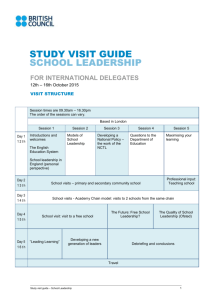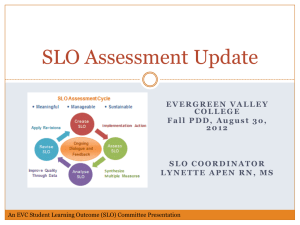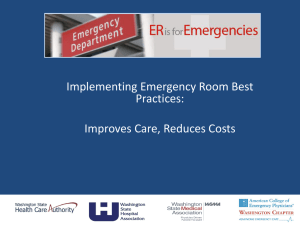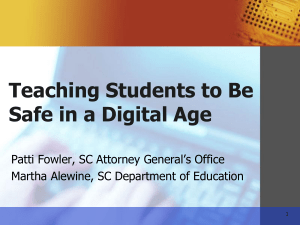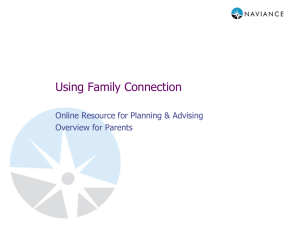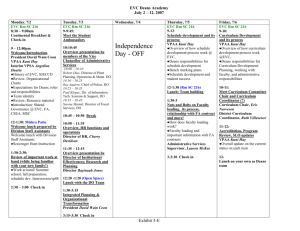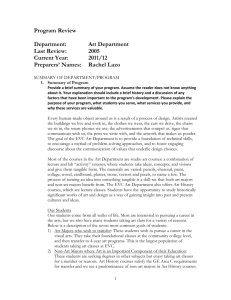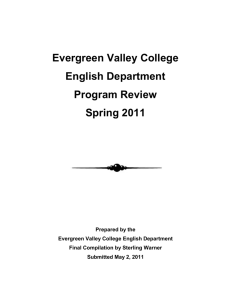This policy on educational trips and visits applies to all educational
advertisement
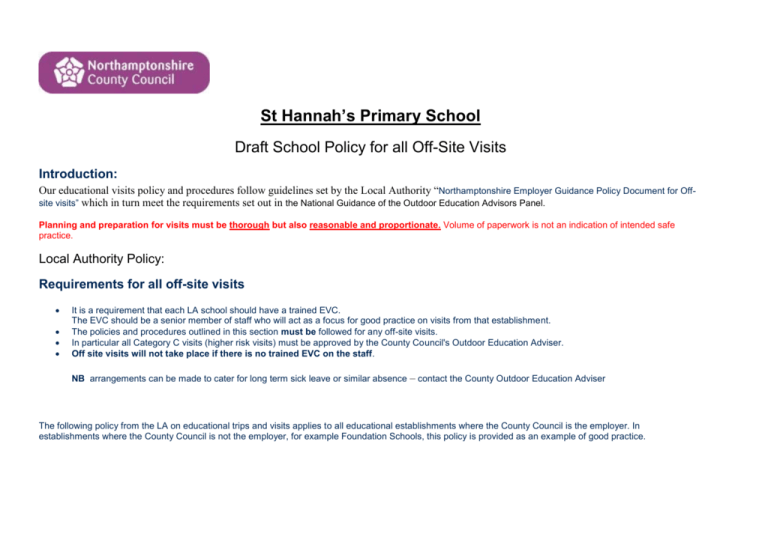
St Hannah’s Primary School Draft School Policy for all Off-Site Visits Introduction: Our educational visits policy and procedures follow guidelines set by the Local Authority “Northamptonshire Employer Guidance Policy Document for Offsite visits” which in turn meet the requirements set out in the National Guidance of the Outdoor Education Advisors Panel. Planning and preparation for visits must be thorough but also reasonable and proportionate. Volume of paperwork is not an indication of intended safe practice. Local Authority Policy: Requirements for all off-site visits It is a requirement that each LA school should have a trained EVC. The EVC should be a senior member of staff who will act as a focus for good practice on visits from that establishment. The policies and procedures outlined in this section must be followed for any off-site visits. In particular all Category C visits (higher risk visits) must be approved by the County Council's Outdoor Education Adviser. Off site visits will not take place if there is no trained EVC on the staff. NB arrangements can be made to cater for long term sick leave or similar absence – contact the County Outdoor Education Adviser The following policy from the LA on educational trips and visits applies to all educational establishments where the County Council is the employer. In establishments where the County Council is not the employer, for example Foundation Schools, this policy is provided as an example of good practice. Policy Statement The County Council will fully comply with the “Northamptonshire Employer Guidance Policy Document for Off-site visits” document. This includes: Establishing and maintaining a trained Educational Visits Co-ordinator for each establishment or cluster of establishments Maintaining an Outdoor Education Adviser Adopting and following the best practice in the “National guidance of the Outdoor Education Advisers Panel” document. All Educational Visits Co-ordinators must undertake a DCSF approved training course and ensure that they attend refresher training at least every three years. The County Council recognises three categories of trip/visit. For further details for each category please click on the appropriate link below. 1. Category A activities – These comprise activities that present no significant risks with no need for the group leader to have National Governing Body or other accreditation 2. Category B activities – Activities which require that the leader has undergone an additional familiarisation process or induction, specific to the visit and / or location 3. Category C activities – Higher risk activities which need approval by the County Council Outdoor Education Adviser Category A and B visits can be approved at establishment level. Each establishment should establish a protocol for agreeing trips / visits. This may include approval by the Educational Visits Co-ordinator, Head-teacher or Governing Body. All educational establishments must seek and obtain the approval of the Outdoor Education Adviser before undertaking any trip or visit which falls into Category C. The County Council will provide each Educational Visits Co-ordinator with an Off-site Visits Guidance pack containing agreed forms which should be used. Responsibilities The County Council is responsible for reviewing and revising this policy on a regular basis and ensuring the provision of an Outdoor Education Adviser. Governing Bodies are responsible for monitoring that their school or unit follows this policy. Head-teachers and Centre Managers are responsible for ensuring that this policy is followed by their establishment including ensuring that they have, or have access to, an appropriate Educational Visits Co-ordinator. The Outdoor Education Adviser is responsible for: providing advice on trips and visits to educational establishments, ensuring the provision of adequate training for Educational Visits Co-ordinators, approving Category C visits; monitoring and implementation of this policy. Categories of trips recognised by Northamptonshire County Council Within this document the term “remote” locations means: Any moorland (open uncultivated land at any height above sea level) Any mountain, woodland and cultivated land from which it would take more than 30 minutes travelling time to walk back to an accessible road or refuge. Accessible road is a road accessible to an ordinary road going ambulance. Refuge is a building, either occupied or with means for summoning help, which can offer shelter for the party in an emergency Procedures at St Hannah’s: Staffing structure and responsibilities: A trained EVC is on the Leadership team at school and is supported by a trained member of administrative staff. All visit notification forms are passed to the administrative EVC any which are category B or C are then passed on to the EVC on the Leadership team. Category A visits can be passed by either of the school EVCs. Category B can generally be passed by the Leadership team EVC. Category C visits must be passed by the Leadership Team EVC, Principal and the County Adviser. It is the responsibility of the visit leader to ensure that all information contained in the notification forms is correct and that these forms are given to the EVC in good time. It is also the responsibility of the visit leader to ensure that all elements contained within the list of ‘things to do’ on the front of the notification form have been carried out. Training: All staff are made aware of procedures to follow when planning and undertaking a visit off school grounds. (See appendix 2 – flow diagram) Risk assessments: Generic risk assessments for a wide variety of activities are available on the EVC Website These generic risk assessments must be made specific to your visit and used on the trip as guidance for all leaders Individual risk assessment may be required. This should be used when individual students may be at risk due to behavioural / medical conditions and extraordinary provision may have to be made to accommodate them safely on a visit. Administering medication when on a school visit: There is no requirement to administer medication – staff undertake this with goodwill A member of staff accompanying the students should take responsibility for this. Prescribed medicines must be in the box that they originally came in with the prescribed dosage and students name clearly labelled and handed in to staff before embarking. Parents must sign to say that they have handed this medication to the member of staff. Any invasive procedures cannot be carried out by school staff and parents should contact school as soon as possible if their child needs this provision and wishes to go on a visit. Any non prescription medicines must also be in clearly named containers and handed in to staff before departure. Parents must also sign to say that they have handed these over. Every time the designated member of staff administers any medication it should be recorded on the relevant sheet and witnessed Insurance: The LA insurance policy covers most eventualities – a copy of this is held at school. Sometimes the visit provider may include insurance in the price of the visit. In this case the county policy will also remain in effect. NB. Claims can only be made from one company. Hospitalisation or need to see a medical professional: If a student needs professional medical attention whilst away they will be accompanied by an adult member of the visit staff (who will all have been CBR checked). Preferably this adult will be of the same gender as the student but if this is not possible then an adult of the opposite gender will remain with them. In European Union countries it is strongly advised that all students take their European Health Insurance Cards with them so that they are entitled to the same medical care as residents of that country. If they do not have these the visit leader will need to pay for their treatment and claim these expenses back from the insurance company. Critical incidents during Residential and International visits If a critical incident occurs during a visit the group leader will contact the designated member of the leadership team who will then contact the Local Authority. To contact Emergency Planning : on tel: 01604 236844 or out of hours 07785 292 851 / 07659 182 932 A suggested Emergency Advice Card to be taken on visits, can be downloaded from the EVC website. Appendix 1 ST HANNAH’S PRIMARY SCHOOL SUGGESTED LIST OF THINGS TO DO – CHANGE AS REQUIRED SUGGESTED ORDER – ALSO SEE FLOW CHART NOTIFICATION OF AN OFFSITE VISIT. Tick when completed Date and staffing passed by leadership team. Insurance arranged – most trips covered by county insurance. Letter sent to parents and copy to School Office. Parental Consent Forms completed and returned Cover work set and staff i/c of cover informed Copy of this form given to Bursar Cash float arranged if necessary Emergency Contact staff member arranged for out of school hours if appropriate Passports checked for overseas visits Member of staff responsible for medication nominated and forms prepared Risk Assessment Form completed and passed by EVC. + any risk assessments for specific individuals (You must check the viability of this trip with a member of the leadership team before completing this form) This form passed to EVC for approval along with group list EVC will then pass form on to reception Other staff made aware of visit through e-mail or staff bulletin All monies received to be paid in to finance office School Office contacted to inform of late return to school Name of Visit: Date Leaving: On the day Medication collected in and recorded Collect First Aid Box Collect student data sheets from front office. School mobile phone collected or own mobile phone checked Collect float When you return Please complete the visit evaluation section and return the form to: Do you need help ? Category C forms and other supporting paperwork to save you work – including generic risk assessments - are available on the EVC Website: www.northamptonshire.gov.uk/evc Your EVC and the County Outdoor Education Adviser are there to help you: County Outdoor Education Adviser: Tel: 01604 368731 studentservices@northamptonshire.gov.uk Appendix 2
